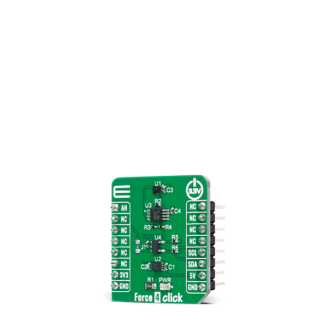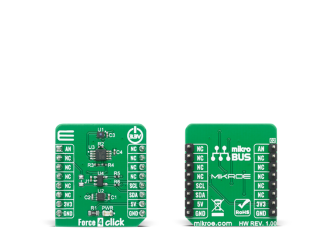
We strongly encourage users to use Package manager for sharing their code on Libstock website, because it boosts your efficiency and leaves the end user with no room for error. [more info]

Rating:
Author: MIKROE
Last Updated: 2020-07-15
Package Version: 1.0.0.0
mikroSDK Library: 1.0.0.0
Category: Force
Downloaded: 3050 times
Not followed.
License: MIT license
Force 4 Click is based on HSFPAR003A piezoresistive force sensor from Alpsalpine. This product is a force sensor using the effect of a piezoresistive bridge circuit formed on silicon diaphragm. Piezoresistive force sensors achieve higher linearity than other force sensors.
Do you want to subscribe in order to receive notifications regarding "Force 4 click" changes.
Do you want to unsubscribe in order to stop receiving notifications regarding "Force 4 click" changes.
Do you want to report abuse regarding "Force 4 click".


Library Description
Library provides function for reading raw ADC data from device.
Key functions:
uint16_t force4_read_adc( void ) - Reading raw 12 bit ADC dataExamples description
The application is composed of three sections :
void application_task ( )
{
uint16_t adc_val;
char demo_txt[ 30 ] = "";
adc_val = force4_read_adc( );
WordToStr( adc_val, demo_txt );
mikrobus_logWrite( "-ADC: ", _LOG_TEXT );
mikrobus_logWrite( demo_txt, _LOG_LINE );
Delay_ms( 100 );
}
Other mikroE Libraries used in the example:
Additional notes and informations
Depending on the development board you are using, you may need USB UART click, USB UART 2 click or RS232 click to connect to your PC, for development systems with no UART to USB interface available on the board. The terminal available in all MikroElektronika compilers, or any other terminal application of your choice, can be used to read the message.